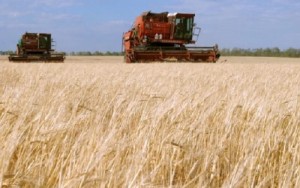Reuters | Tuesday June 9 2009
- Russian role in world food security needs investment
- Sees grain exports doubling within 10-15 years
- Better technology, infrastructure needed
By Amie Ferris-Rotman and Karl Plume
MOSCOW/CHICAGO, June 9 (Reuters) - The Kremlin's pledge to ease a world food shortage needs investment in port capacity and farming know-how if Russia and its Black Sea neighbours are to usurp the United States as the world's biggest grain supplier. Russia, with a tenth of the world's arable land, said at the weekend it could double grain exports within 15 years. By becoming a top supplier in a world where every sixth person goes hungry, it aims to carve out a similar key role in food security to the one it holds in energy supply.
But while some in the grain markets believe the Black Sea region can become the bread basket for the entire world, right now it does not have the capacity to do so.
"They are some years away from being considered a massive grain powerhouse," said Gavin Maguire, director at Chicago brokerage EHedger, though he added the region had potential.
"If they did invest significantly in the infrastructure there -- building roads, building rail and port facilities that are capable of moving meaningful amounts of grain -- we could have something interesting emerge over the next decade or so."
Russia plans to add 50 percent to its grain harvests by bringing into use some 20 million hectares of derelict farmland, or an area the size of West African nation Senegal. The target was unveiled by President Dmitry Medvedev at the Kremlin's showcase World Grain Forum in St Petersburg.
This extra grain could meet a chunk of a forecast 50 percent rise in world demand over the next two decades, a result of the more than 60 million people born each year, Asia's rapid growth and the better diet sought by a 2 billion-strong middle class.
Medvedev called the world's fixation with profit "immoral" and backed a proposal to create a global grain reserve to better administer food resources and curb price spikes such as those that led to riots from Haiti to Senegal to Indonesia last year.
"Russia is on a growing line in efforts to end hunger. Russia has been very proactive," said Sheila Sisulu, deputy executive director of the United Nations' World Food Programme.
Meeting its promises will require Moscow to spend billions of dollars upgrading port capacity and rail links. Analysts say it might also require a more open approach to investment in land and new technology than Russia has shown with energy resources.
Foreign oil, gas and metals firms do not control Russia's most prized resource assets and investors were spooked by the battle for control at BP's joint venture, TNK-BP, and the ousting of Shell as head of the Sakhalin-2 gas project.
"Over time, we expect to see Russia, Ukraine and Kazakhstan becoming more important in world grain markets," Luke Chandler, director of agricultural commodities research at Rabobank, said.
"There are political risks as well. That may slow down the investments until there is some certainty in terms of being able to operate in the free market."
BLACK SEA BLOC
A Black Sea trade bloc proposed by Moscow at the forum could raise the combined share of Russian, Ukrainian and Kazakh wheat exports to between 30 percent and 35 percent of world trade from 24 percent, said Russian Agriculture Minister Yelena Skrynnik. Russia alone, propelled to third among the world's wheat exporters after last year's record crop, plans to increase total grain exports to between 40 million and 50 million tonnes when it produces 135 million tonnes of grain within 10 to 15 years. If it can apply technology to boost yields -- a hectare of Russian wheat yields under 2 tonnes compared with the U.S. average of 2.8 tonnes and 5.5 tonnes in the European Union -- Russia has the land to meet these targets, officials said. "It would make an impact if Russia increases its intensity of grain production," Klaus Rohland, World Bank country head for Russia, told Reuters. But this will take time. European Bank for Reconstruction and Development (EBRD) President Thomas Mirow, while welcoming Russia's initiative, said poor infrastructure and opaque legislation were hurdles to the sector's development. International commodity firms with a foot already in the Black Sea region would be keen to invest in grain facilities there, lured by the prospect of hefty returns when exports rise. "They would need private enterprise for this to work, but the idea of an OPEC-type cartel could scare foreign investors away," Maguire said.Russia, an aspiring WTO member, has distanced itself from the "grain OPEC" idea periodically pushed by former Agriculture Minister Alexei Gordeyev. But even its alternative plan to create a world grain reserve could be a hard sell.
Officials at the forum suggested such a reserve would first need to be administered on a national basis. "It cannot be global unless it is local," said Sisulu from the World Food Programme.
(Additional reporting by Robin Paxton, Aleksandras Budrys and Dmitry Zhdannikov, writing by Robin Paxton; Editing by Keiron Henderson)













